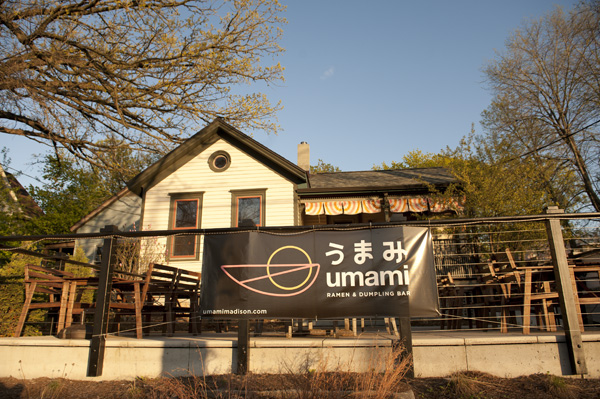
Ten years ago native New Yorkers Randy Ng (below left) and Michael Ding (below right) were friends in Brooklyn who regularly played basketball together and daydreamed about opening a dumpling shop. Both men are of Chinese heritage, so for them, making dumplings was a family affair — a part of Chinese New Year, and a staple of any family event.
By 2009, Ding was disenchanted with his job on Wall St. and approached Ng seriously with the idea of pursuing their dream. Madison, Wisconsin, seemed the perfect location. Ng had left his job at an educational startup and had moved to Madison the previous year, and Ding was himself an alumnus of UW, returning annually to attend Badgers games. They both were looking for a change.
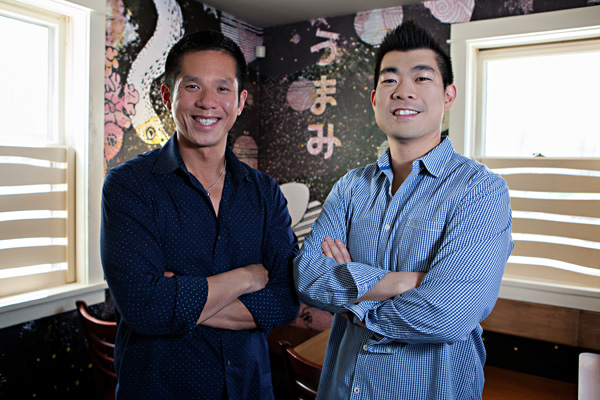
The team knew that they had dumplings down, but that dumplings alone couldn’t sustain a business. They turned to friend Conrad Seto, a self-taught, self-proclaimed ramen fanatic, who had spent five years studying the “art of the noodle.” His personal passion turned into a career as a consultant / chef, hosting ramen pop-up dinners regularly in the San Francisco Bay area at Flavor Restaurant. Ng and Ding flew Seto to Madison to host a 20-person tasting to help gauge the city’s reaction to ramen; it was a success.
From there they were off and running, taking a 10-day research trip to Japan to sample ramen for Ng and Ding’s soon-to-be restaurant, Umami Ramen & Dumpling Bar. Umami, the Japanese word loosely translated as “savoriness,” is accepted worldwide as the fifth basic taste along with sweet, sour, bitter, and salty.
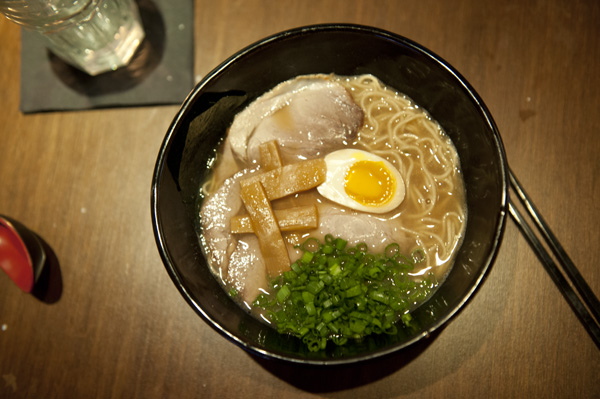
Ramen is now Japan’s national dish. Originally adopted from Chinese La Mian (hand-pulled noodles), it became popular after World War II when there was a shortage of produce and an abundance of wheat flour from the U.S. government. The Japanese adapted the dish over the years and took it to a new level as ramen. “In Japan people really respect you if you can master tonkotsu-style ramen made from pork bones,” explains Ding. “It takes more than 14 hours and has many steps. It’s the opposite of how you learn to cook in French culinary school: bringing it to a hot rapid boil, and knowing just when the right time is to add the aromatics.”
Ng and Ding took more research trips to Taiwan for recipes and to New York City for inspiration from restaurants whose aesthetics they wanted to emulate. Their discovery and acquisition of a restaurant space sealed the deal and turned their year-and-a-half-long journey into a reality. Working with an architect responsible for designing a Wisconsin Tibetan temple, Ng and Ding created an unusual space with an element of surprise. Starting with a converted house with a patio, formerly an 1880s blacksmith’s shop located on Willy St., they created a homey Japanese restaurant with an urban edge. It recently won an award for historic preservation from the Madison Trust for Historic Preservation.
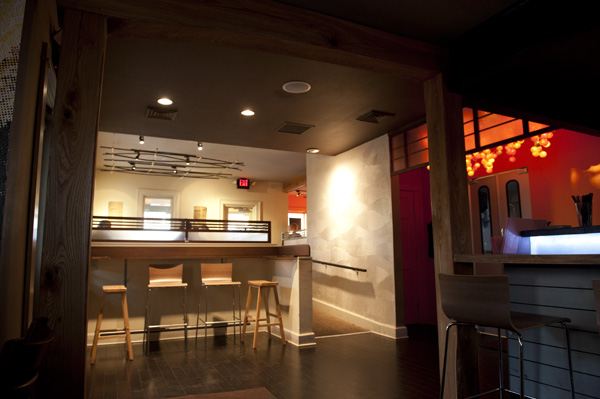
Madisonians love food, enjoy a lot of choices, and are very accepting of ethnic cuisine, evident if only by the number of Nepalese restaurants available. However, Ng and Ding made special considerations in planning the menu to adapt to Umami’s Midwestern location. While Madison has several noodle places, they are usually Chinese or Vietnamese, not Japanese, which is typically associated with sushi. Most ramen places in Japan focus on a single type of broth, but Ng and Ding realized that wouldn’t work in Madison, where ramen is still new and where people (especially in a college town) associate ramen with the instant ramen sold 3 for $1.00. To distinguish their ramen offering from the supermarket variety, they decided to offer a variety of broth options.
While Umami’s menu is pork-centric, in addition to their signature tonkotsu ramen ($12) they offer four other varieties, including vegan and vegetarian (both with a seaweed and mushroom broth), shoyu chicken ramen, and miso chicken ramen. “People new to ramen are familiar with miso because it is a popular starter at Japanese restaurants, so they are comfortable trying it,” explains Ding. All the broths are made in house, and in deference to local demand for vegetarian options, veggie-driven dishes are plentiful.
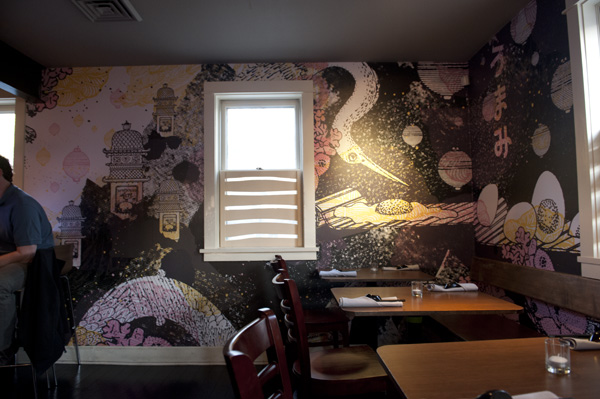
The noodles found in all Umami’s ramen are made fresh for Umami by RP’s Pasta Company, a local pasta maker known for using hand-rolled processes. The pH level from kansui, a mixture of alkaline salts added to the water, gives ramen noodles more springiness than Italian semolina pasta. The presentation of the ramen is artful. Several varieties include a “flavor-infused” soft-boiled egg that adds both color and flavor and is soaked in pork shoulder brine for 6 hours before being served.
Umami offers four varieties of dumplings — the classic pork and chive ($6 / $8) come straight from Ding’s mother-in-law’s well-loved recipe. They are paper thin, crispy on the bottom, and offered with a choice of dipping sauces: soy vinegar, sweet, and spicy. The vegetable summer rolls ($5) are bright, crispy, and fresh, served with a spicy peanut sauce. The only seafood on the menu, tuna poke ($10), is a must. Sashimi-grade ahi tuna is served with seaweed salad and apple cucumber slaw in a sweet soy sauce, atop crispy pork rinds. It’s a balanced bite of salty / sweet and crispy / meaty each time.
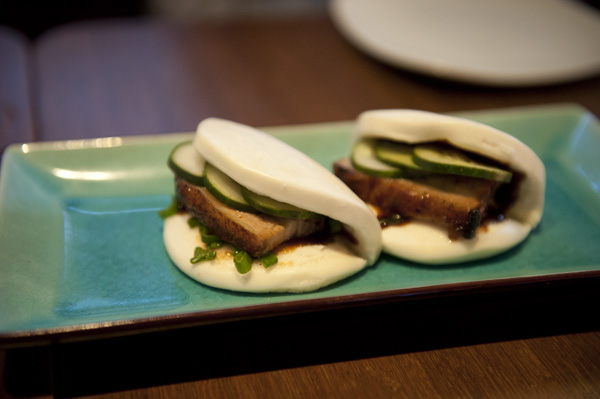
Two other items deserve special mention. The pork buns ($7) feature roasted, thick, juicy pieces of Berkshire pork belly and pickled vegetables in a homemade hoisin sauce stuffed inside a fluffy steamed gwa pao bun (Taiwanese clamshell style). If you prefer spicy over sweet, try the ones filled with Korean beef. Finally, although you are sure to be full, the green tea crème brulee ($6) is a flavorful end to a savory meal.
Umami Ramen & Dumpling Bar just celebrated its one-year anniversary in March. Ng and Ding plan to continue what they’ve started at Umami, and they also hope to open a restaurant that offers sushi and a branded food cart on University of Wisconsin’s nearby campus. “As a young adult in New York I never would have imagined myself making the move to Madison, but I wouldn’t change a thing,” Ng says. “Somewhere along the line I figured out what to do with my life. ” But despite his success, he sees room for growth. “My sous chef commented the other day that he has never worked in a restaurant that has become so successful so fast. While I can appreciate that on the surface, deep inside I feel we can always do better, and that we cannot afford to rest on our laurels.”
Umami Ramen & Dumpling Bar, 608.819.6319, 923 Williamson Street Madison, WI

To the writer:
How would you compare the Ramen in the Twin Cities to this place?
Author to KJ:
Sorry for the insanely late reply! I would say their ramen is totally on par. In particular, Umami is notable because of all those other dishes mentioned above – making it much more than a ramen shop. A year and a half later and I still an dreaming of a return trip to Madison for those pork buns and tuna poke!